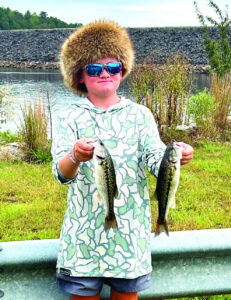Program tackles stress of caregiver burnout
RUSSELLVILLE — Many people deal with caregiver burnout. Kids and Kin childcare partner Marquita Wilson presented a program at the Russellville Public Library to discuss symptoms, identify risks and share coping strategies.
Wilson described caregiver burnout as physical, emotional and mental exhaustion — the result of providing long-term care without relief.
She said providers look at both mental and physical symptoms when assessing burnout and encouraged caregivers to be honest about their struggles.
Wilson listed signs that often mirror depression or anxiety. Those include fatigue, withdrawal from friends and family, irritability, changes in sleep or appetite, and feelings of hopelessness.
She said caregivers also describe emotional strain such as anxiety, frustration, guilt and denial about a loved one’s condition, which can turn once-positive caregiving into a negative cycle.
“In a nutshell, when you have loved ones, you provide better care for them when you take care of yourself first,” Wilson said. “When your personal health is better, you have better emotional capacity.”
Wilson said one way to help mitigate the effects is for caregivers to take time to focus on themselves.
“I think it helps when caregivers engage in activities that are centered on their needs, like hobbies, anything they’re enthusiastic about, because it helps them not lose sense of self and identity.”
She explained that burnout harms both the caregiver and the person receiving care.
When caregivers delay their own medical visits or neglect their health, they become more vulnerable to serious problems. That in turn affects the quality of care they can provide.
Wilson pointed to pressures that drive burnout, including heavy responsibilities, limited resources and the belief that only one person can do the job.
She said full-time caregivers and people in helping professions face higher odds, especially when they lack a strong support system.
Wilson devoted part of the program to prevention. She encouraged participants to find someone they trust, set realistic goals and share responsibilities rather than trying to manage everything alone. She also highlighted simple routines that help lower stress.
“Coffee dates with friends or family members at least once a month,” she said. “Having a regular routine that lowers stress helps. Maybe trips to a park or inviting someone over. The person you’re caring for starts to expect it, too.”
Wilson said recovery looks different for everyone. Some regain balance within weeks, while others need months.
She suggested counseling, support groups, hobbies and respite care as ways to reduce stress and restore energy. She pointed to local options such as respite care, hospice care, senior centers, ARC of the Shoals and adult day care services.






